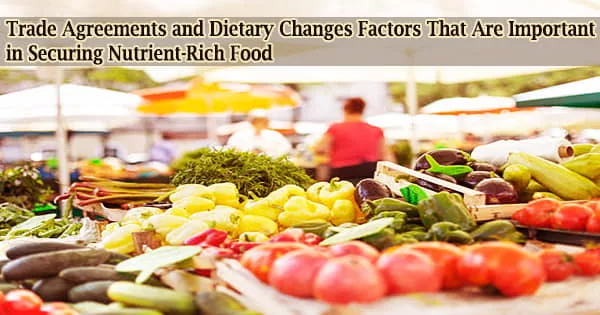Future decisions on commerce, diet, and climate change, according to research from the University of Southampton, will be vital in ensuring the UK has access to food containing micronutrients.
Scientists have concluded that important influences on our food supply, and consequently, the breadth and level of micronutrients available to individuals through their food, include things like Brexit, a shift to plant-based diets, and any additional disruption from the COVID-19 pandemic.
The UK is deficient in a number of essential vitamins (A and C) and minerals (calcium, zinc, and iron). To ensure that the populace gets the recommended daily supply of essential micronutrients, we rely on imports rather than native produce.
“The pandemic has shown the importance of nutrition in keeping healthy and fighting off infection. It is important for public health that people can maintain a healthy diet through readily available food sources,” said lead researcher, Professor Guy Poppy, who is also Deputy Executive Chair of the Biotechnology and Biological Sciences Research Council (BBSRC).
“If the UK is to become more nutrient self-sufficient, it will require a range of actions to change production and how much is grown domestically, coupled with some significant changes in consumer food preferences.”
There is an increasing call for a more plant-based diet to help address climate change but this will be a challenge based on current patterns, especially if we continue to rely on imports of fruit and vegetables which can’t be grown in the UK. This increase in vegetarianism and veganism will require careful policy and decision making, as the bioavailability of micronutrients from meat and dairy is something not easily replicated by plants. Consideration will be needed over how to ‘eat for the health of the human’ as well as ‘eat for the health of the planet’.
Dr. Jenny Baverstock
The researchers looked at data from many sources demonstrating how the security of micronutrients has changed between 1961 and 2017. Additionally, they simulated future scenarios involving domestic production, imports, and the availability of animal and plant food sources, and they examined 2017 overseas trade data from HM Revenue and Customs to evaluate the supply of food abroad before the EU exit.
According to research that was published in the journal Nature Food, the UK has become far more dependent on imports to meet its micronutrient needs since the 1960s.
For instance, before joining the EU, the majority of our vitamin C was produced domestically; today, the majority is imported in the form of fruits and vegetables. The two countries that contribute the most to this import total Spain and the Netherlands make up around half of all European nations.
The study also demonstrated how trade agreements over the past 60 years have impacted the supply of important micronutrients, highlighting the significance of trade for the food supply as the UK negotiates post-Brexit accords.
Co-author of the paper, Dr. Jenny Baverstock added: “There is an increasing call for a more plant-based diet to help address climate change but this will be a challenge based on current patterns, and especially if we continue to rely on imports of fruit and vegetables which can’t be grown in the UK.”
“This increase in vegetarianism and veganism will require careful policy and decision making, as the bioavailability of micronutrients from meat and dairy is something not easily replicated by plants. Consideration will be needed over how to ‘eat for the health of the human’ as well as ‘eat for the health of the planet’.”





